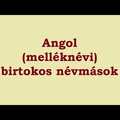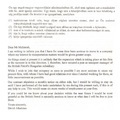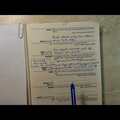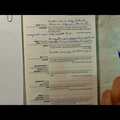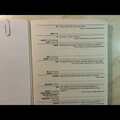The verb ‘DO’ with different auxiliaries
CAN – can do, *can not do, *cannot do, *can’t do (*certanity/likelyhood), (WH) Can (sy) do?
I can do my homework alone.
I can’t do it if I don’t have enough information.
Can she do her hair?
How can you do it without any help?
*He can’t do the housework – he hates doing it.
COULD (past* and conditional**) could do, could not do, couldn’t do, (Wh) Could (sy) do?
*I could do business with him and it was very profitable.
*He could do nothing without the proper tools.
*They couldn’t do the cooking because there weren’t any vegetables at home.
*Could he do the shopping with the list I had written to him?
*When could you do everything?
**If we could do the cleaning before she arrives home, she would be very happy.
**He couldn’t do the research now because he didn’t have the necessary information.
**Could we do him a favour for his help in our work?
**How could we do a deal with him if don’t have any money?
MAY – may do, may not do, (Wh) May (sy) do?
I may do my best – you know I have been preparing for this for a long time.
May this medicine do me good?
He may not do the exam today. He was very sick this morning.
How may they do a good job without the right tools?
MIGHT – might do, might not do, (Wh) Might (sy) do?
We might do our chores now. We have a lot of free time.
They might not do the operation during an earthquake.
Might he do an interview with the Prime Minister? You know, he doesn’t like the present government.
What might the boss do when none of the workers come to work?
WILL – will do, ‘ll do, will not do, won’t do, (Wh) Will (sy) do?
I think he will do everything for keeping his job.
I won’t do your make-up – do it for yourself.
Will she do a drawing of the married couple?
What will you do if nobody applies you?
WOULD – would do, ‘d do, would not do, wouldn’t do, (Wh) Would (sy) do?
If you helped me, I would do you a favour.
The class wouldn’t do the maximum if you weren’t their teacher.
Would your accountant do the account for you firm if you had one?
What would you do, if you were fired?
SHALL I? – (Wh) Shall I do?
I don’t like to be the in our hobby garden. What can I do there? Shall I do gardening?
What shall I do while you are cooking?
SHALL WE? – (Wh) Shall we do?
Shall we do the shopping before peak time?
When shall we do the exercises for the best results?
SHOULD – should do, should not do, shouldn’t do, (Wh) Should (sy) do?
You should do what your boss tells you.
You shouldn’t do this; you do damage for your liver.
Should I do something new to have more customers?
What should I do in the shop to make customers come in and buy our goods?
OUGHT TO – ought to do, ought not to do, oughtn’t to do, (Wh) Ought (sy) to do?
The class ought to do a test today but I’m sure they don’t know anything.
You ought not to do loud things when your kids are sleeping.
Ought he to do if faster to finish it at the weekend?
What ought he to do to finish it faster?
USED TO – used to do, did not use to do, didn’t use to do, (Wh) Did (sy) use to do?
I used to do the washing up, but now I have a dishwasher.
I didn’t use to do any exercises when I was younger, but nowadays I have to go to the gym at least 3 times a week.
Did you use to do dangerous things when you lived in the mountains?
Where did you use to work when you lived abroad?
NEED TO – need to do, needs to do, do not need to do, don’t need to do, does not need to do, doesn’t need to do, (Wh) Do(es) (sy) need to do?
I need to do business for my living.
I don’t need to do a lot of work to earn my living.
Does he need to do a deal every day for having a profitable job?
What does she need to do for having a comfortable life?
MUST (*necessity; **certanity/likelihood) must do, ***must not do (=to forbid!) , ***mustn’t do
*We must do it now and not later!
**I think they must be doing it now – I can hear the machines working.
***You mustn’t do the accounts alone – I’m sure you will make mistakes.
*Must you do this every time my parents come to visit us?
*What must we do if we want them to help us?
HAVE TO – have to do, has to do, do not have to do, don’t have to do,does not have to do, doesn’t have to do, (Wh) Do (sy) have to do? (Wh) Does (sy) have to do?
I have to do a project tomorrow.
He has to do the paperwork and after that he can relax.
You don’t have to do homework this week.
She doesn’t have to do any makeup – she is pretty without it, too.
Do I have to do the cleaning? I’ve got no time!
Does he have to do vacuuming now? I want to work, but I can’t in this noise.
What do I have to do for some food?
When does he have to do the maximum in the match – during the first half or the second half?
(Also with “have got to”)
BE ABLE TO – I’m able to do, I’m not able to do, (Wh) Am I able to do?; (he) is able to do, (he)’s able to do, (he) is not able to do, (he) isn’t able to do, (Wh) Is (he) able to do?; (you) are able to do, (you)’re able to do, (you) are not able to do, (you) aren’t able to do, (Wh) Are (you) able to do?
I’m able to do 12 km per hour for about an hour.
The storm is able to do damage in the building.
They’re able to do the maximum with the proper help.
I’m not able to do good when I am hungry.
He isn’t able to do any studying without the right books.
We aren’t able to do the shopping without money.
Am I able to do this exam? Yes, I think I am.
Is he able to do his test now? He was very sick last night.
Are the boys able to do exercises outside is the rain?
What is he able to do after working 20 hours without a break?
What are you able to do under water without oxigen?
MUST HAVE III – (certanity/likelihood) must have done, must’ve done
He must have done something that the boss didn’t like and that’s why he was fired.
You can say anything – you must have done that you shouldn’t have done.
CAN’T HAVE III - (certanity/likelihood) can’t have done
They can’t have done any work during the working hours and that’s why they are not ready.
He received reprimand. He can’t have done his duty.
COULD HAVE III – could have done, could’ve done, could not have done, couldn’t have done, (Wh) Could (sy) have done?
I could have done my homework but I didn’t have the mood.
He couldn’t have done the accounts so he gave it to me.
Could they have done business abroad with more money?
How much work could they have done at the office with better equipment?
MAY HAVE III – may have done, may’ve done, may not have done, (Wh) May (sy) have done?
I may have done something that she didn’t like.
You may not have done the maximum, but what you did is enough.
There is a lot of food in the fridge. May she have done the shopping while we were at the cinema?
What may they have done with the car? It won’t start.
MIGHT HAVE III – might have done, might not have done, (Wh) Might (sy) have done?
Bob might have done the vacuuming – the carpets are very clean.
The postman might have not brought the parcel that we have been waiting for days.
Might the cleaner have done laundry, too? Every clothes is clean and smelling good.
What might he have eaten that has made him sick?
WOULD HAVE III – would have done, ‘d have done, would not have done, wouldn’t have done, (Wh) Would (sy) have done?
I would have done something if I had had much more time.
She wouldn’t have done it if he hadn’t told her nasty things.
Would you have done exercises if she had asked you to?
What would you have done if you hadn’t been able to go to the party?
SHOULD HAVE III – should have done, should’ve done, should not have done, shouldn’t have done, (Wh) Should (sy) have done?
We should’ve done a course and we could mend it now.
You shouldn’t have done the ironing without asking her.
Should I have done the washing-up? Sorry, I haven’t gone into the kitchen all day so I haven’t seen that the sink is full.
What should I have done to make her happy?
OUGHT TO HAVE III – ought to have done, ought not to have done, oughtn’t to have done, (Wh) Ought (sy) to have done?
They ought to have done military service and they could know what is in the army like.
You ought not to have done drugs – your health is very bad now.
Ought he to have done some gardening in his free time to have some fun?
What ought we to have done to finish this job earlier?
DIDN’T NEED TO – didn’t need to do
He didn’t need to do the shopping, so he had some time in the afternoon.
I didn’t need to do a degree for getting this job.
NEEDN’T HAVE III – needn’t have done
He needn’t have done a good job – his boss will fire him.
You needn’t have done the shopping – the fridge is full of food!
HAD TO – had to do, did not have to do, didn’t have to do, (Wh) Did (sy) have to do?
I had to do exercises because I wanted to get into shape for the beach season.
He didn’t have to do a course because he had the necessary knowledge.
Did she have to do the housework all alone? Didn’t her husband help her?
What did you have to do for this car?
HAVE BEEN ABLE TO – have been able to do, ‘ve been able to do, have not been able to do, haven’t been able to do, has been able to do, ‘s been able to do, has not been able to do, hasn’t been able to do, (Wh) Have (sy) been able to do? (Wh) Has (sy) been able to do?
I have been able to do a good job because I’ve got a good salary so far.
He’s been able to do great translations for a long time.
I haven’t been able to do drawing since I lost my best pencils.
He hasn’t been able to do exercises for some weeks. You know, he had an accident and broke his arm.
Have you been able to do gardening since you bought a garden?
Has she been able to do the housework since she came out of hospital?
How much work have you been able to do this week?
How long has your little daughter been able to do crosswords?


